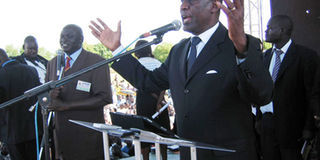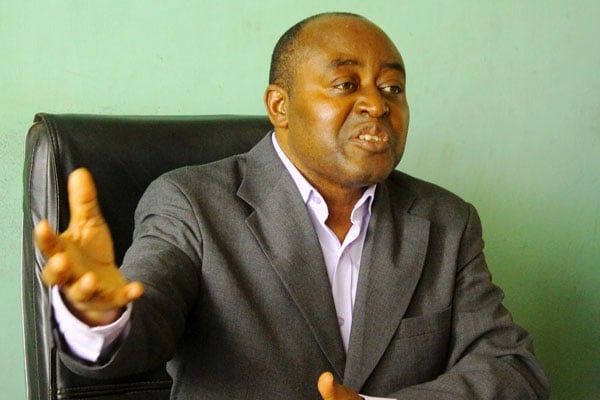Putting NRM 29 years in perspective as Soroti hosts celebrations

Soroti Municipality MP Mike Mukula talks to his constituents on Sunday. PHOTOs BY SIMON PETER EMWAMU.
What you need to know:
Assessment. Depending on where one stands, NRM has either succeeded or failed in many promises to Ugandans.
Kampala. The National Resistance Movement (NRM) will today celebrate 29 years in power at Boma Grounds in Soroti Town.
A lot has changed in the 29 years with the first Cabinet formed now retaining only Dr Crispus Kiyonga (Defence Minister), Gen Moses Ali (third deputy premier), Dr Ruhakana Rugunda(Prime Minister) and Kahinda Otafiire (Justice).
As a political movement, it is only chairman Museveni and his deputy chairman, Mr Moses Kigongo, who have steadily held office for the last 29 years in NRM.
The promise
When he took oath of office as Uganda’s 9th president, Mr Museveni made a promise that his was “not a mere change of guard but a fundamental change.”
Depending on where one stands, NRM has either succeeded or failed in delivering this and many subsequent promises to Ugandans.
With the end of the war in northern Uganda, promoters of the NRM argue the party has achieved peace and stability in all parts of the country.
In his 2011 to 2016 manifesto, President Museveni writes: “Uganda is now a totally peaceful country, with security assured for all citizens. The peace and security we are enjoying, is irreversible.”
There, however, has been a rise in killings similar to the 1970s and 1980s which President Museveni described as ‘senseless’. The 2013 Crime, Traffic and Road Safety Report showed the number of cases of murder by shooting in Uganda rose by 14 per cent. In 2013 police investigated 131 cases of gun-shot murder, compared to 115 in 2012. The number is likely to be even higher basing on current media reports. A total of 426 cases of death by mob action were reported to Police. Then there was the death of 92 Ugandans in the Rwenzori region in July 2014 which dented the credentials of security forces’ ability to protect Ugandans.
Writing ahead of today’s NRM celebrations, NRM party deputy spokesperson Ofwono Opondo painted a picture of a peaceful Uganda capable of exporting peace to other countries. “Uganda once regarded as a failed state in the 1970s and 1980s has since regained her glory among nations. Not only is Uganda peaceful and vibrant, she is now a key contributor to troubled countries like Somalia, South Sudan and Central African Republic,” Mr Opondo writes.
But renowned lawyer and academic Frederick Ssempebwa holds Mr Opondo’s statement true only for the first 10 years, especially on the question of good governance. “The first 10 years of the 29 were very developmental for the country. We came from a situation of near collapse to one where the whole world looked at us as a model but subsequent to the 10 years in terms of good governance, there has been a slide down yet good governance affects development. It is only people in urban areas that are experiencing relative development but in rural areas the situation is very bad,” Prof Ssempebwa says.
Prof Ssempebwa, who chaired the commission that reviewed the 1995 Constitution, says the failure by the President to appoint a substantive Chief Justice following the retirement of immediate former Chief Justice Benjamin Odoki is a show of failure.
“The failure to have a Chief Justice has affected the smooth running of government. The judges of the Supreme Court have no one to lead them, they do things on their own because they cannot be led by a junior. We have three distinctive arms of government including the Judiciary. Once the Judiciary has no head, it cannot perform. The person holding the portfolio knows he was not properly elected, the judges are on their own, I know for a fact a judge can go for a conference without seeking for permission causing a standstill.”
One of the core promises of NRM in its famous Ten Point programme which later was extended to fifteen was the elimination of poverty, hunger, illiteracy, disease, corruption and sectarianism. However, UPC spokesperson Okello Lucima thinks the 29 years have been contrary to the promises.
“The 29 years of the NRM has ensured we are in a deep position of inequality, majority of our people are poor and this is not what somebody claiming to fight for equality promised.”
Quoting the rising GDP figures, from 1986 to date and an ‘impressive social progress’ in his manifesto, President Museveni argues there has been a significant lift of the majority of Ugandans from income poverty.
Corruption
While the NRM government is credited for setting up several institutions like the Inspectorate of Government coupled with laws to fight corruption, the vice remains widespread with many government officials indicted as perpetrators. So entrenched is corruption that if it is fought on a large scale, it could bring down the whole government. Over Shs 500 billion is annually lost to the vice according to the World Bank.
“We thought 29 years ago, we had got the country out of impunity but institutions are not working. Unfortunately the things we fought for, are all lost for example we have no chief justice, corruption is at its epic, political opponents are treated like enemies of the State and freedom of speech is not 100 per cent guaranteed,” says John Kikonyogo, the FDC party spokesperson.
“With one man at the helm of power, 29 years can only end in a disaster like history has shown all these have ended disastrously. Look at what happened to Mobutu, Muammar Gaddafi, Ben Ali and Mubarak,” says Mr Lucima.
To former Leader of Opposition in Parliament, Prof Ogenga Latigo, when it comes to January 26, the day has to change from a celebration to a day of remembrance.
“For some it will be a celebration while for others it will be a commemoration. Why not instead turn it into a day of remembrance so that it represents a broad spectrum of Ugandans. As long as it is a celebration, it remains divisive because those who see the good things will continue to celebrate while those who see otherwise will mourn,” he says.
NRM praised in Soroti
Under the NRM government Teso sub-region has undergone economic and social growth, Mr Mike Mukula, the Soroti Municipality MP, who is also NRM vice chairman for eastern region, has said.
Speaking to Daily Monitor at the weekend, Mr Mukula said Teso sub-region was proud to host the 29th Liberation Day celebrations, which will be held in Soroti District.
He said the health sector in the sub-region is in a good condition. “Already as we come to celebrate, government and the Islamic Bank are at advanced stages to have hospitals like Soroti upgraded,” Mr Mukula said.
He added: “At this stage there is no need for Teso again to support the Opposition because everything possible has been executed to support the social-economic transformation of the country.”
Mr Mukula said the NRM government brought peace and security to Teso, Sebei, Lango, Acholi, and parts of Bugisu, which were ravaged by Karamojong cattle rustlers.
“To date 43,000 guns have been recovered from Karamoja, this is a victory worth appreciating. Peace and stability has been regained in the whole of Teso, people are back in their homes,” he said.
However, the FDC mobiliser for Soroti District, Mr Paul Omer, said instead of celebrating, there should be mourning for NRM’s alleged mismanagement of the country and violation of human rights.
He said the President should apologise for crimes allegedly committed by NRA and security agents.
“Bringing the celebrations in Teso is like helping Museveni to glorify the killings in Teso by his NRA, looting of our animals,” Mr Omer said.
He lamented that the education system, health and infrastructure are in a sorry state.
He decried rampant corruption, poverty and unemployment.
Mr Santos John Labeja, lecturer in international relations and diplomatic studies at Cavendish University, claimed that the NRM has turned Ugandans into hostages, adding that “coercion, manipulation and intimidation are the order of the day”.
Mr Labeja said the NRM government uses state institutions to intimidate people.



